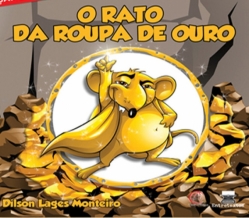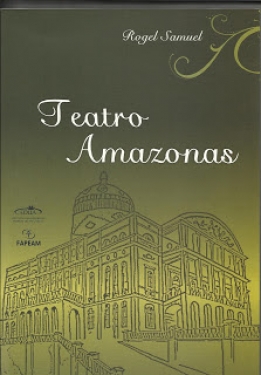Xadrez: Grandes Mestres que não se sagraram campeões mundiais (1)
 Por Flávio Bittencourt Em: 03/04/2013, às 15H21
Por Flávio Bittencourt Em: 03/04/2013, às 15H21

[Flávio Bittencourt]
Xadrez: Grandes Mestres que não se sagraram campeões mundiais (1)
Ramirez de Lucena, Damiano, Ruy López.
FOTO HISTÓRICA: CONCEDE SIMULTÂNEA A MENINOS INTELIGENTES E ESTUDIOSOS MEQUINHO [HENRIQUE MECKING], O BRASILEIRO QUE FOI O QUARTO ENXADRISTA DO MUNDO, ATRÁS APENAS DE FISCHER, KARPOV E POLUGAIEVSKI (este não chegou a ser campeão, também...)
"O título de "Campeão Mundial de Xadrez" é algo recente, e o primeiro campeão oficial de xadrezreconhecido como tal é Wilhelm Steinitz, que deteve o título de 1866 a 1894. Entretanto, existem jogadores de renome no Xadrez há bem mais tempo, e alguns deles são creditados como sendo os melhores de seu tempo, sendo considerados, de certa forma, campeões mundiais."
(http://pt.wikipedia.org/wiki/Anexo:Lista_de_campe%C3%B5es_mundiais_de_xadrez)
"SE RUY LÓPEZ NÃO PODE SER CONSIDERADO CAMPEÃO MUNDIAL DE XADREZ DE
SEU TEMPO, EU NÃO SOU UM MICO LEÃO DOURADO EM VIAS DE EXTINÇÃO, MAS SOU
O ÚNICO DODÔ QUE SOBROU VIVO NA FACE DA TERRA!"
(O RESPONSÁVEL PELA PRESENTE COLUNA)
"[POLUGAIEVSKI] No logró ser campeón del mundo porque sus contemporáneos eran demasiado fuertes. Pero los aficionados le veneraban por sus cualidades como entrenador, su constante búsqueda de la belleza sobre el tablero y, sobre todo, su gran calidad humana. A los 61 años, el ruso Lev Polugaievski rezumaba ilusión por la vida, además de un infinito amor por el ajedrez, pero este veterano gladiador no pudo superar las secuelas de un tumor cerebral. Murió el pasado 30 de agosto en París, donde sus restos serán inhumados -el día 6, en Montparnasse- cerca de los de otro aje drecista inmortal, Alexánder Aliojin.Polugaievski llegó dos veces a las semifinales del Mundial (1977 y 1980), pero carecía del instinto asesino que distingue a Fischer, Kárpov y Kaspárov.
(CCCCCCC ===)
http://en.wikipedia.org/wiki/Luis_Ram%C3%ADrez_de_Lucena
"(...) Lucena [ENXADRISTA ESPANHOL DOS SÉCULOS 15 / 16] wrote the oldest existing printed book on chess, Repetition of Love and the Art of Playing Chess (Repetición de Amores y Arte de Ajedrez con 101 Juegos de Partido), published in Salamanca in 1497. The book contains analysis of eleven chess openings but contains many elementary errors that led chess historian Harold Murray to suggest that it was prepared in a hurry (Murray 2012:786). The book was written when the rules of chess were taking their modern form (see origins of modern chess), and some of the 150 positions in the book are of the old game and some of the new. Fewer than a dozen copies of the book exist. (...)"
http://en.wikipedia.org/wiki/Luis_Ram%C3%ADrez_de_Lucena
The Lucena position is named after him, even though it does not appear in his book. (It was first published in 1634 by Alessandro Salvio.) Thesmothered mate (later named Philidor's legacy) is in the book.[1]
[edit]References
- Hooper, David and Kenneth Whyld (1996). The Oxford Companion to Chess. Oxford University. ISBN 0-19-280049-3.
- Murray, H.J.R. (2012) [1913], A History of Chess, Skyhorse, ISBN 978-1-62087-062-4)
[edit]External links
- Romeo, M.C. "Lucena - A mystery after 500 years".[dead link] (Romeo is Director of History Chess Commission of Spanish Federation of Chess, FEDA.)
- Lucena's book online
http://en.wikipedia.org/wiki/Luis_Ram%C3%ADrez_de_Lucena
"Como, no caso do Nobel de Física, Lattes não o recebeu, e, no caso do de Literatura, tampouco foram laureados Borges, Henry James, Ibsen, Zola, Tolstoi, Machado de Assis, Lima Barreto, Jorge de Lima, Monteiro Lobato, Bandeira, Guimarães Rosa, Erico Veríssimo, Jorge Amado, Paulo Jacob, João Cabral, Cecília Meirelles, Vinicius de Moraes, Maria Clara Machado, Drummond, Mário Quintana, Clarice Lispector, Dom Marcos Barbosa, Haroldo de Campos, Luiz Bacellar [poeta amazonense já falecido, infelizmente], Rogel Samuel [romancista da 2ª geração do pós-modernismo brasileiro], Adrino Aragão de Freitas [co-inventor do miniconto, no Brasil], Rubem Fonseca, Paulo Coelho e Jorge Tufic [criador do micro-haicai: o primeiro da série [CONCEITO DOS ANOS '10 DO SÉCULO PASSADO, DOS FORMALISTAS RUSSOS DO GRUPOOPOIAZ] foi o seguinte: "ode/campo/bode"], que foram - ou são, os vivos - gênios da pena."
(C R...)
"A GRANDE QUESTÃO NÃO É A DE QUEM RECEBEU OU NÃO O NOBEL DE FÍSICA OU DE QUEM DETEVE OU NÃO O TÍTULO DE CAMPEÃO MUNDIAL DE XADREZ (PELA FIDE OU PELA ===pesquisss===), MAS QUEM FORAM OU SÃO OS MAIORES DO RAMO!
===em edição=== UNIFICAREIII===
3 MICRO-HAICAIS
A Nicolau de Mello,
in memoriam
castanha
Lucena
Espanha
A Jorge Tufic
Tigran
torre
Petrossian
A Geraldo Lima
ataque
Fischer
baque
(Flávio Bittencourt,
hoje)
"PARECE QUE ERRAMOS (OU NÃO): CERTA VEZ MENCIONEI AQUI NA COLUNA QUE O EX-CAMPEÃO MUNDIAL DE XADREZ QUE JOGOU UMA SIMULTÂNEA SENSACIONAL CONTRA QUARENTA JOGADORES CARIOCAS FOI O HOLANDÊS MAX EUWE; RECEBI UM GENEROSO E CONSTRUTIVAMENTE CRÍTICO E-MAIL DE UM IDOSO ENXADRISTA AABBEANO [SÓCIO DA AABB, FUNCIONÁRIO APOSENTADO DO BANCO DO BRASIL] DIZENDO QUE HOUVE ENGANO MEU, QUE O CAMPEÃO QUE CONCEDEU SIMULTÂNEA NAQUELA NOITE MEMORÁVEL À QUAL COMPARECI - FICANDO NA PLATEIA, E NÃO NO ROL DOS DESAFIANTES DO JÁ IDOSO ENXADRISTA QUE SE APRESENTAVA NA AABB DO RIO FOI O RUSSO ===1º NOME AQUI ===em edição===
SMYSLOV; COMO EU NÃO VIM AO MUNDO PARA DIZER QUE NÃO ERRO JAMAIS, ESTOU CHECANDO ESSA INFORMAÇÃO PARA VER SE OS DOIS JOGARAM NAQUELA ASSOCIAÇÃO RECREATIVA OU SE EU EFETIVAMENTE, POR LAPSO DE MEMÓRIA, TROQUEI OS NOMES [ERRAR UMA VEZ É FALHA QUE PODE SER PERDOADA, AFINAL OS DOIS GÊNIOS ERAM CONTEMPORÂNEOS GRISALHOS, CAUCASIANOS E GRANDES MESTRES INTERNACIONAIS DE XADREZ], MAS, NESSE CASO, EU NÃO POSSO ERRAR NOVAMENTE, SE É QUE EU incorri em falha nossa e NÃO O LEITOR AMIGO (como ele não é Deus, pode estar equivocado) ESTOU CONFERINDO ESSE DADO, JÁ QUE O AMIGO LEITOR AFIRMA QUE O DR. EUWE NÃO CONCEDEU SIMULTÂNEA NA AABB NOS ANOS '70, MAS EU QUE ESTAVA CORRETO QUANDO AFIRMEI QUE V. Korchnoi===EM EDIÇÃO (conferîndo-se o prenome e a grafia do sobrenome)=== JOGOU UMA SIMULTÂNEA [MAIS SENSACIONAL AINDA] NA HEBRAICA DO RIO DE JANEIRO, QUANDO APAGOU A LUZ E ELE CONTINOU A JOGAR! (o prezado leitor desta coluna afirma que esteve nos dois Clubes cariocas, AABB e Hebraica, nessas duas ocasiões magnas"
"Vasily Smyslov vs Max Euwe
FIDE World Championship Tournament (1948) · Spanish Game: Open Variations. Howell Attack (C81) · 1-0
|
OBSERVE COMO OS TRAJES DESSES SENHORES ERAM PARECIDOS UNS COM
OS OUTROS (MAS UM ERRO DE LEGENDA NÃO JUSTIFICA O NOSSO LAPSO, QUE
SERVE PARA QUE FIQUEMOS MAIS ATENTOS ÀS INDICAÇÕES DE PESSOAS E COISAS):
" (...) After the war
Following the death of Aljechin in 1946, there had been difficulties in deciding how another World Champion would be appointed. FIDE decided to take the matter into their own hands but had difficulty in arranging a suitable tournament particularly as the emergence of Soviet players in international tournaments had begun to muddy the waters and they were not members of FIDE. In many post-war international events, Euwe had been particularly successful and by 1947 the Soviets indicated that they could be persuaded to join the International Federation and throw their weight behind an arrangement to decide the World Championship competition. Accordingly, FIDE arranged a meeting in the Netherlands for 1947 that the Soviets agreed to attend. However, the meeting started without any of the Soviets present and there was no indication whether or not they were going to attend. After two days, the meeting declared Euwe the World Champion and then set about deciding how the title would be contested in the future. Eventually the Soviets did put in an appearance, declared their intention to join FIDE and then the whole matter of the World Championship went into the melting-pot and resulted in the Match Tournament held in 1948. Euwe who had been the World Champion for two days then resigned his title! This tournament was not a succes for Euwe and he became last with 4 out of 20 games.
In 1949 after a few years as professional player Euwe became a teacher again.
Euwe the writer
Euwe was known for his opening knowledge and has written many chess books and chess series. The classics he wrote were Oordeel en Plan (Judgement and Plan) and Oom Jan leert zijn neefje schaken (Uncle John learns his nephew chess). His books are translated in many languages all over the world.
Professor
Euwe did a lot of physical exercise and was an amateur boxer. After 1950 he concentrated more on Mathematics and Informatica. In 1964 he became Professor Doctor in Automisation of Information at Erasmus University in Rotterdam and he also became appointed at the University of Tilburg.
FIDE President
Euwe was FIDE president from 1970 until 1978. He had an important role in the organisation of the match of the century between Spassky and Fischer in Reykjavik in Iceland.
Euwedied on 26th November 1981, in Amsterdam at the age of 80 years. He was married with Carolina Elisabeth Bergman. They had 3 daughters.
In memoriam
In 1982 the Max Euwe Centrum was opened (NL - Max Euwe Centrum). The Max Euwe centrum contains a chess museum with some top pieces like the chess set given by Hitler or Himler to Mutsaers during the second world war. There is also a square named to him, the Max Euweplein."
()
CARTA DE OUTRO LEITOR IDOSO, MINEIRO, QUE NÃO APONTA FALHA NOSSA [minha], MAS ACERTO DO DR. CUNHA E SILVA FILHO:
Li emocionadissimo o artigo sobre a CESB (CASA DO ESTUDANTE SECUNDARIO DO BRASIL, Sen Pompeu, l69) Vivi lá por um grande periodo e, em pesquisas, nunca havia conseguido algo a respeito. Puxa vida! Voces deram a este velhinho uma grande alegria. Seria possivel um contato para troca de reminiscencias? Não sou saudosista mas estive por mais de quarenta anos como asilado politico "intra-fronteiras" fugindo da policia politica.Em um livro de pequenos textos postado no BlogSpot AQUI TEM RETALHINHOS' relato passagens desta saga estudantil,citando inclusive passagens pela CESB. Obrigado a voces por esta chance de recordar, pois a memória me falha as vezes (69 anos). Por favor retornem.
Manoel Amaral (mineiro)
O LEITOR REFERE-SE AO CONTEÚDO DE:
"Pedro Damiano de Odemira

Pedro Damiano de Odemira (Odemira, Portugal, 1480 — 1544) foi um teórico português do jogo de xadrez e o primeiro problemista de xadrez de Portugal, não se conhecendo com exactidão as datas do seu nascimento e morte. Não confundir com o religioso italiano Pietro Damiano.
Obras
Damiano (também traduzido por Damião) de Odemira é famoso por ter escrito um dos primeiros tratados sobre enxadrismo, escrito originalmente em italiano e espanhol, denominado Questo libro e da imparare giocare a scachi: Et de belitissimi Partiti, publicado em 1512, em Roma, cidade para onde havia fugido quando da expulsão dos judeus de Portugal, durante o reinado de D. Manuel I. Segundo fontes coevas, Damiano seria boticário em Odemira, contudo existe muita falta de documentação que comprove esta afirmação feita pelo próprio Damiano. Ora como se deveria tratar de um cristão-novo fugido de Portugal, é natural que o próprio apresentasse pistas falsas, pelo que certos autores duvidam inclusivamente da sua naturalidade.
Em 1997, o xadrezista Rui de Carvalho Nascimento fundou em Lisboa a Tertúlia Damiano de Odemira, com a participação dos mestres de xadrez Gabriel Mariz Graça, José Vinagre, Vasco Santos, Mário Silva Araújo, Pedro Silva Araújo, Dagoberto Markl, M.I. Joaquim Durão e António Pedro Vinagre. A tertúlia não se dedica exclusivamente ao xadrezismo, mas a diversos temas culturais, artísticos, literários ou científicos.
Em sua honra, realiza-se anualmente na vila de Odemira o torneio de xadrez Open Internacional Damiano de Odemira. Também nesta vila existe uma estátua sua.
Referências
- ARAÚJO, Mário Silva. Damiano, o Português e a sua Obra.
- CHICCO, Adriano; PORRECA, Giorgio. Dizionario Enciclopedico degli Scacchi, 1971.
- LE LIONNAIS, François; MAGET, Ernest. Dictionaire des Échecs, 1974.
- SUNNUCKS, Anne. The Encyclopaedia os Chess, 1976.
(http://pt.wikipedia.org/wiki/Pedro_Damiano_de_Odemira)
"Ruy López de Segura

Ruy López de Segura (Zafra, perto de Badajoz, 1540 c. — Madri, 1580 c.) foi um padre e enxadrista espanhol cujo livro Libro de la invención liberal y arte del juego del Axedrez foi um dos primeiros livros de fundamentos do Xadrez na Europa. Ele estudou e viveu em Salamanca, sendo considerado por muitos o primeiro campeão mundial de xadrez não-oficial. [1]
A Abertura Ruy López é assim denominada em sua homenagem. Essa antiga abertura, também conhecida como Abertura Espanhola, é empregada pelos mestres até nossos dias. [2]
Referências
Obras utilizadas nas referências bibliográficas
- FILGUTH, Rubens. Xadrez de A a Z: dicionário ilustrado. Porto Alegre : Artmed, 2005. ISBN 85-363-0529-0.
- HOOPER, David e WHYLD, Kenneth. The Oxford Companion to Chess. Londres : Oxford University Press, 1987. ISBN 0-19-281986-0
Categorias:
(http://pt.wikipedia.org/wiki/Ruy_L%C3%B3pez_de_Segura)
"(...) 4. Nicaragua part set Sc 1004-1008.... Can anyone get me the other three???
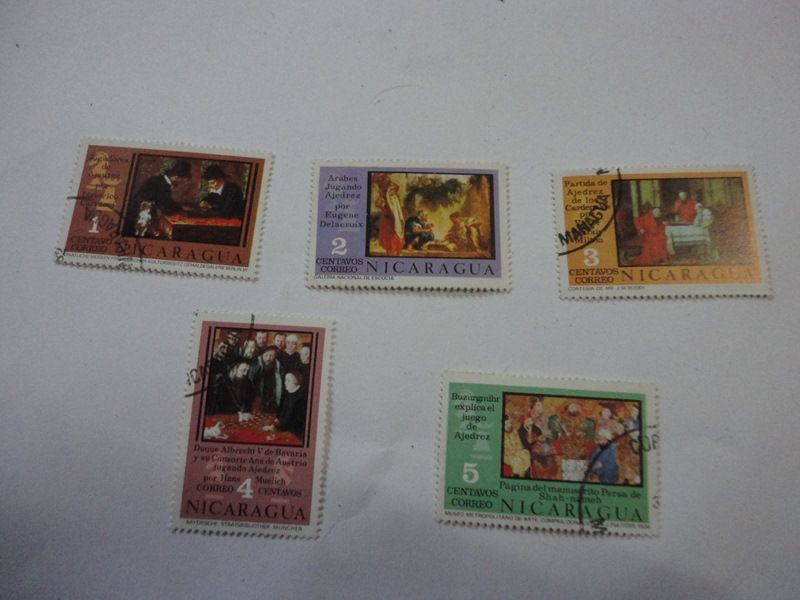
5.Cambodia Sc 1385-1388 , Sc 1389 1000r missing
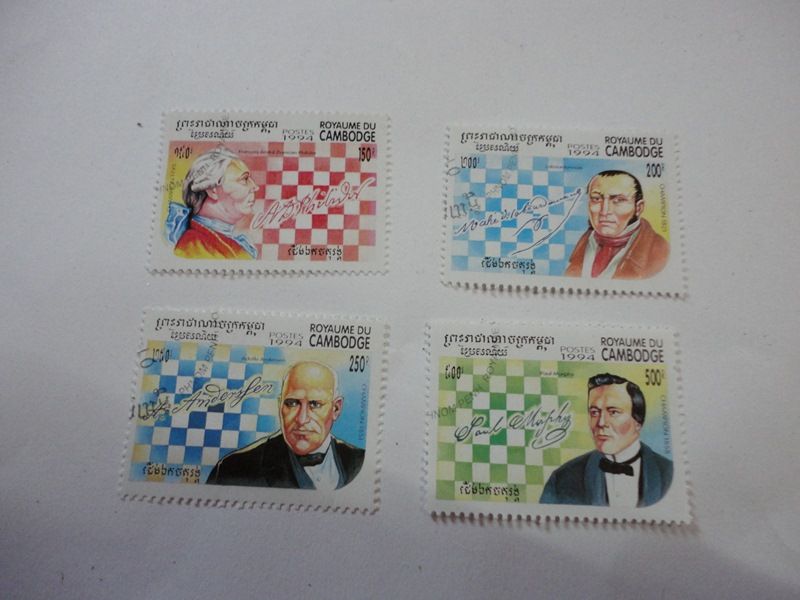
6. Hungary part set 1974 chess players.. Sc 2289-2292...... 2293-2295 missing.
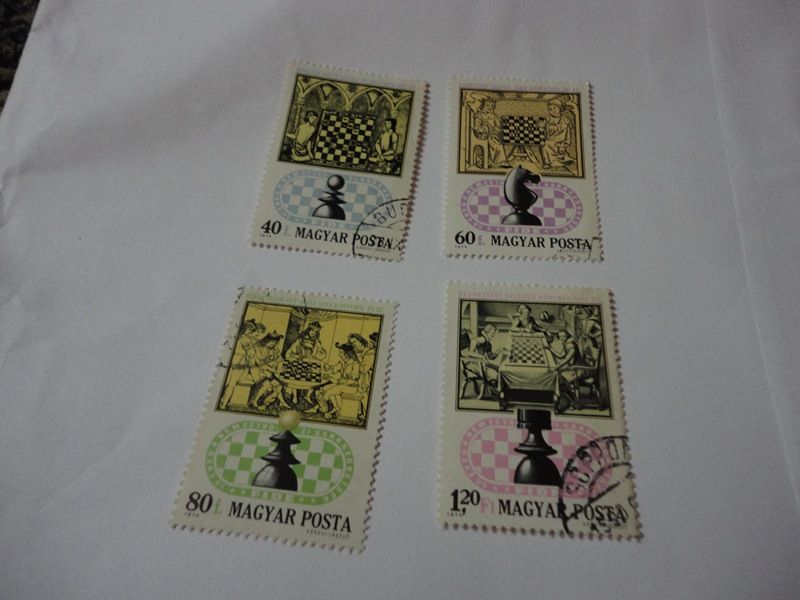
_________________
Started to collect post-Independence India, help me complete the voids
http://www.stampboards.com/viewtopic.php?f=9&t=29439 (...)"
[http://www.stampboards.com/viewtopic.php?f=12&t=42636]
===
(https://sites.google.com/site/caroluschess/worldchampions/max-e











